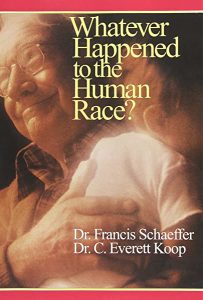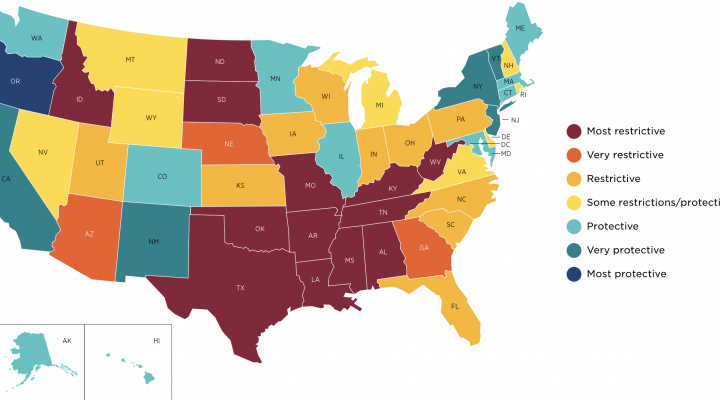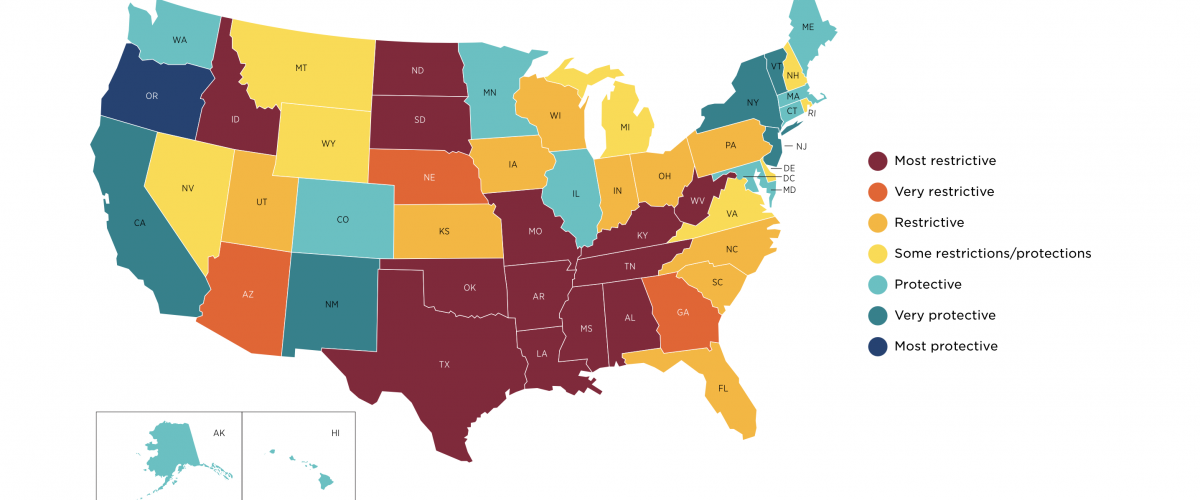The U.S. Supreme Court overturned Roe v Wade on June 24, 2022, ending half a century of broad abortion access. Since then, the battles have moved to the states, creating a multi-hued map one state official called a “hodgepodge of laws.”
Thirteen GOP-led states had trigger laws on the books that were set to restrict access once Roe was overturned. Since then, other red states have enacted new restrictions, including Florida, where Gov. Ron DeSantis, a presidential candidate, signed a six-week abortion ban April 13.
The next day, Colorado Gov. Jared Polis signed three bills protecting abortion and transgender care that will make the state a “beacon of care.” These bills protect people from prosecution or lawsuits back home if they travel for abortions or transgender medical care, require insurance plans to cover abortions and restrict the work of Crisis Pregnancy Centers, also known as CPCs.
Nationally, 25 states and the District of Columbia protect abortion access.
Nationally, 25 states and the District of Columbia protect abortion access, and some of these states have added new laws to make sure women who travel for abortions can’t be prosecuted in their home states. Last year, 2,345 women from Texas accessed abortion care in Colorado, up from 400 the previous year.
 Six years after the 1973 Roe v. Wade decision legalizing abortion, Francis Schaeffer and C. Everett Koop’s produced a book and film titled Whatever Happened to the Human Race? This galvanized evangelicals to join pro-life Catholics and declare abortion their No.1 social and political issue.
Six years after the 1973 Roe v. Wade decision legalizing abortion, Francis Schaeffer and C. Everett Koop’s produced a book and film titled Whatever Happened to the Human Race? This galvanized evangelicals to join pro-life Catholics and declare abortion their No.1 social and political issue.
Since then, evangelicals have relied on two main strategies to reduce the number of abortions: (1) Legislation and (2) ministries that give women viable alternatives by providing the resources and support they need to carry a pregnancy to term.
One ministry, Care Net, was founded as Christian Action Council in 1975 by theologian Harold O. J. Brown, who had been inspired by Schaeffer and Koop. Care Net now oversees a network of 1,100 affiliated pregnancy centers it says has saved 941,453 babies from abortion since 2008. Today, CPCs far outnumber abortion clinics — 51 to 20 in Colorado — but they provide limited medical services and uniformly counsel clients against having abortions.
The Texas Legislature last year elected to invest $100 million of taxpayer dollars in abortion-alternatives programs over two years, according to the Associated Press. In addition, AP found a dozen states were allocating $89 million to fund CPCs, up from $17 million a decade earlier. States have used tax dollars to support pregnancy ministries since Gov. Robert Casey of Pennsylvania signed the first such legislation in 1991.
But in Colorado, Illinois and Connecticut, legislation restricts the activities of CPCs and prohibits them from engaging in what pro-choice forces consider “false advertising.” Some CPCs have claimed to offer abortion services they don’t actually provide — just to get women in the door. And once there, the critics allege, the women are subjected to “misinformation” to convince them not to have an abortion. For example, some CPCs have told women abortions increase the risk of breast cancer, a claim medical groups dismiss. Sen. Elizabeth Warren of Massachusetts says CPC “torture” women.
“Pro-life” forces vary in their defense, ranging from outright insistence that whatever deception is needed to “save babies” is justified to those who point out not all CPCs operate that way.
In Colorado, one of seven states placing no time limits on abortion access, SB-190 prohibits “deceptive” advertising as well as the use of abortion “reversal” pills in crisis pregnancy centers.
State Sen. Janice Marchman, a Democrat, explained: “Anti-abortion centers present themselves as legitimate family planning reproductive health care clinics, but these fake clinics use deceptive advertising to draw in vulnerable people seeking care to harass them with biased and inaccurate information about abortions and contraceptives. People who go to these clinics looking for help report being shamed and lied to — the exact opposite of the safe and accurate care we are beholden to protect as elected officials.”
Anti-abortion groups condemn such laws. A Colorado CPC board member called claims of misinformation or deceptive practices “laughable” and “nonsensical.” Care Net offers a report that it says rebuts “the misinformation spread by critics of pregnancy centers” with “widely collected data, client satisfaction surveys covering thousands of people.” And the Colorado Catholic Conference says these laws are unconstitutional and prevent women from exercising choice.
Life Network, which operates three CPCs in Colorado Springs, did not respond to a request for comment about the law’s impact.
Efforts to restrict the work of CPCs have run into legal challenges.
Elsewhere, efforts to restrict the work of CPCs have run into legal challenges. Courts have halted California’s repeated efforts to force CPCs to give women information about where they can get abortions, and in Cambridge, Mass., home to Harvard University, an effort to ban CPCs was dropped due to legal problems, and a deceptive advertising bill was passed instead.
The Family Research Council, founded by James Dobson, says dozens of CPCs have been attacked since the Supreme Court’s draft opinion overturning Roe was leaked in May 2022.
Six states voted on abortion-related measures in 2022, the most in U.S. history. And in all six cases, freedom to choose abortion won the day. Seven more state measures are planned for 2023 and 2024.
In 1990, Nevada voters passed a measure allowing abortion access through the first 24 weeks of pregnancy. On Tuesday, May 30, new Republican governor, Joe Lombardo, stuck with his 2022 campaign pledge to maintain those protections and added new protections for women forced to travel for abortions.
“Gov. Lombardo made a campaign commitment to sign a law ensuring that Nevada would not participate in prosecuting those seeking legal medical care in the state,” said a spokesman for Lombardo, a card-carrying “pro-life” candidate who has been endorsed by the National Right to Life Committee.
Two female Republican senators supported the Nevada bill. Sen. Heidi Seevers Gansert of Reno said, “Given the hodgepodge of laws across the U.S., the one thing that jumps off the page to me is: Women who face these difficult choices, we need to give them our support and our prayers, but we don’t need to give them jail time.”
On the federal level, a new battle is raging over so-called “medication abortion,” a way to end an early term pregnancy with a combination of two pills.
Related articles:
Author of Texas abortion bill is shocked its vague language is confusing
Restrictions on abortion making Americans believe in greater accessibility
Life post-Roe: Is there middle ground between religious liberty and medical freedom? | Analysis by Mallory Challis


